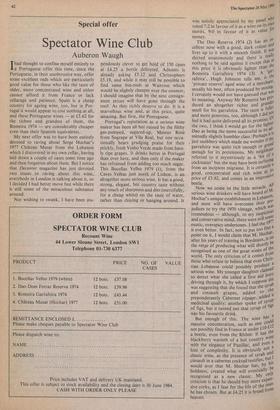Special offer
Spectator Wine Club
Auberon Waugh
IThad thought to confine myself entirely to Portuguese offer this time, since the Portuguese, in their unobtrusive way, offer some excellent reds which are particularly good value for those who like the taste of older, more concentrated wine and either cannot afford it from France or lack cellarage and patience. Spain is a cheap country for ageing wine, too, but in Por- tugal it would appear to cost nothing at all, and these Portuguese wines — at £3.62 for the richest and grandest of them, the Romeira 1974 -- are considerably cheaper even than their Spanish equivalents.
My next offer was to have been entirely devoted to raving about Serge Hochar's 1977 Château Musar from the Lebanon which I discovered in my own cellar, having laid down a couple of cases some time ago and then forgotten about them. But I notice that Decanter magazine has just devoted two issues to raving about this wine, everybody in London is talking about it, so
I decided I had better move fast while there is still some of the miraculous substance around.
Not wishing to swank, I have been stu-
pendously clever to get hold of 150 cases at £4.25 a bottle delivered. Adnams is already asking £5.12 and Christophers £5.19, and while it may still be possible to find some bin-ends at Waitrose which would be slightly cheaper over the counter, I should imagine that by the next consign- ment prices will have gone through the roof. As they richly deserve to do. It is a marvellous wine and, at this price, quite amazing. But first, the Portuguese.
Portugal's reputation as a serious wine maker has been all but ruined by the filthy gas-pumped, sugared-up, Mateus Rose from Sogrape at Vila Real, but one occa- sionally hears grudging praise for their prickly, fresh Vinho Verde made from bare- ly ripe grapes. It drinks better in Portugal than over here, and then only if the maker has refrained from adding too much sugar. This Bucellas Velho 1979 (I), from the Caves Velhas just north of Lisbon, is an altogether more serious wine. It has a good, strong, elegant, hot country taste without any touch of sharpness and dies (mercifully, for a cheap white) on the taste of water, rather than cloying or hanging around. It
was noisily appreciated by my panel who voted 7:2 in favour of it as a wine on its own merits, 9:0 in favour of it as value f°I. money. The Dao Reserva 1974 (2) has an ex- cellent nose with a good, dark colour and lives up to it with a smooth finish. It was elected unanimously and there is reallY nothing to be said against it except that at this price it is obviously lighter than the Romeira Garrafeira 1974 (3). A 'gar rafeira', Hugh Johnson tells me, is the `private reserve' aged wine of a merchant' usually his best, often produced by mixing,. I certainly would not have guessed that was its meaning. Anyway Mr Romeira has Pro- duced an altogether richer and grander smell for his garrafeira. The taste is fuller t and more generous, too, although did rinc feel it had quite delivered all its promise. °I the two, I think I would go for the fete! Dao as being the more successful in its ad- mittedly slightly humbler class. Perhaps it Is just snobbery which made me wonder tithe, garrafeira was quite rich enough or grail' enough for its pretensions. My neighbour referred to it mysteriously as a 'bit of 3 cockteaser' but she may have been suffering from an incipient migraine. It is certainly a good, concentrated and rich wine at its price of £3.62, and comes in an impressive bottle.
Now we come to the little miracle. serious wine drinkers will have heard of Hochar's unique establishment in Lebanon, and most will have overcome their Pre- judices to try the 1970 vintage, which was tremendous — although, to my suspicOns and conservative mind, there were still some exotic, overspicy undertones. I feel the 1977 is even better. In fact, not to put too fine a point on it, I would claim that M. Rocha'', after his years of training in Bordeaux, is °n the verge of producing what will shortlY be recognised as one of the great wines of the world. The only criticism of it comes from those who refuse to believe that even CbriS tian Lebanese could possibly produce serious wine. My younger daughter claimed to detect what she called a first aid lorry driving through it, by which I suppose she was suggesting that she found that the Syrall and cinsault grapes, added to the preponderantly Cabernet cepage, added a medicinal quality; another spoke of syroP of figs, but it turned out that syrup of figs was his favourite drink. But enough of this. The wine has ll massive concentration, such as one could not possibly find in France at under £10-E'' a bottle, even from the Rhone. It has the blackberry warmth of a hot country wine with the elegance of Pauillac, and even ! hint of complexity. It is obviously not classic wine, as the presence of syrab and cinsault in a cabernet cocktail testifies, but would aver that M. Hochar has, by his boldness, created what will eventually be recognised as a new classic. My only criticism is that he should buy more exPen- sive corks, as I fear for the life of the ones hheeahvaesn.chosen. But at £4.25 it is bread from














































 Previous page
Previous page